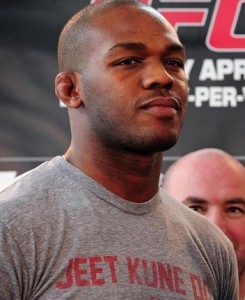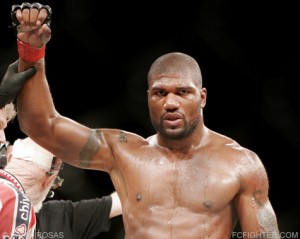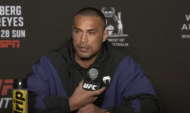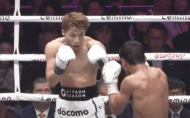Opinion: Crime, But No Punishment For MMA Fighters

Light heavyweight champion Jon Jones is one of the latest MMA icons to face a run-in with the law but, to date, has still not been handed down any kind of punishment from his employer, the UFC.
Is the UFC doing a disservice to the sport of MMA and sending a dangerous message by not disciplining its fighters who break the law?
By Jesse Heitz
Mixed Martial Arts has made tremendous strides since its inception twenty years ago, enjoying a steady growth in popularity over the better part of the last decade. This has undoubtedly been a difficult climb for a sport that was once labeled by Senator John McCain as “human cockfighting”.
Despite such unfair criticism, the sport continues its progression toward legitimacy. Its combatants have evolved from simple barroom brawlers and back-alley scrappers to technical and calculated professional fighters. All of this for the sake of gaining mainstream acceptance for the sport and its largest promotion, the UFC.
The legitimacy campaign instituted by the UFC through its implementation of improved rules, pre-fight health screenings, and banned substance screenings, has established MMA as arguably the safest full-contact sport in the world. Under the UFC’s watchful eye, no fighter who has graced the inside of “The Octagon” has suffered a grievous injury within its confines. One would think that this alone should be enough to guarantee the sport’s mainstream acceptance. Unfortunately, that simply isn’t the case. In some overly influential circles it’s still viewed as a modern form of barbarism.
The reality for any modern professional sport is that its claim to legitimacy and its public acceptance is heavily influenced by the conduct of its ambassadors, the players and fighters themselves. In a world of social networking and an unrelenting media presence, the conduct of fighters is never out of the consuming public’s purview, which can be a major liability for both organizations and the sport as a whole.
The important issue that needs to be reconciled is that the United States—the largest market which still poses the greatest impediment to the growth of MMA, is seeing its love affair with professional athletes grind to a halt. Gone are the days when sports icons like Mickey Mantle and Hank Aaron were unashamedly adored by fans.
Today’s American sports fan and the sports consuming public at large seem to hold professional athletes in significantly less esteem, preferring to assign flaws rather than points of admiration. Grossly inflated paychecks are certainly a part of fan hostility, but the personal, particularly criminal, failings of athletes and the trend of sports organizations to refrain from offering any form of significant punishment has solidified fan resistance to embracing athletes.

Quinton "Rampage" Jackson's 2008 meltdown endangered the lives of many, including his own, yet he did not face any disciplinary action from his bosses at the UFC
For well-established sports such as football, baseball, basketball, etc., fan indifference isn’t a potentially crippling problem. However, for a young sport such as MMA, which is still banned from being able to operate in the nation’s most lucrative sports market, New York, maintaining the integrity of the sport requires that fighters from the premier promotion carry themselves in a professional manner when they’re outside of the Octagon and swiftly punished when they don’t.
For all the great things that the UFC has done to advance the sport, to propel it to heights once thought unattainable, it has as of yet failed to take a hard-line on the personal misconduct of fighters as the other sports leagues have, most notably the NFL.
For the NFL, it had finally had enough of the off-field misconduct of its players that it created a new conduct policy. Since then there have been several high-profile incidents in which a player’s personal misconduct has led to stiff penalties from the NFL. Then Tennessee Titans cornerback Adam “Pacman” Jones was charged with two felonies in 2007 stemming from an altercation at a Las Vegas strip club. From 2005 to 2008, Bengals wide receiver Chris Henry had been arrested numerous times for charges ranging from drunk driving to the illegal possession of a gun. Cowboys defensive tackle “Tank” Johnson was arrested for multiple gun charges from 2005 to 2006.
Steelers quarterback Ben Roethlisberger had two sexual assault allegations levied against him in 2009 and 2010. The NFL duly punished the aforementioned players. Jones was suspended for the whole 2007 season and part of the 2008 season. Johnson, and Henry were suspended for the first half of the 2007 season. Roethlisberger, although never charged, was suspended for six games, which was subsequently reduced to four games.
For the UFC, the tale has been much different. In July of 2008, following his championship bout loss to Forrest Griffin, Quinton “Rampage” Jackson, led police officers on a car chase, driving down the wrong side of the road and on sidewalks. He was charged with two felony counts for evading the police, three misdemeanor counts of hit and run with property damage, and one misdemeanor count of reckless driving.
Jackson ultimately pled guilty to one felony count of evading police and one misdemeanor count of driving recklessly. The UFC offered no suspension, allowing him to fight five months later against Wanderlei Silva at UFC 92. He was then offered a fight against Keith Jardine at UFC 96 in order to determine who would challenge Rashad Evans for the title.
In January 2011, current Middleweight title challenger, Chael Sonnen, pled guilty to money laundering in connection with mortgage fraud. The UFC declined any form of in-house punishment. In October of that year he was ushered back into the title hunt with a fight against Brian Stann at UFC 136. In just a few days Sonnen is slated to once again face Anderson Silva for the title, this time at UFC 148.
Most recently, on May 19, 2012, Light-Heavyweight king Jon “Bones” Jones, pled guilty to DWI charges after crashing his Bentley into a pole. Again, no punishment offered by the UFC. Jones is currently slated to take on Dan Henderson in September at UFC 151.
Simply put, the difference between the two approaches to player/fighter discipline is striking.
Certainly, the UFC can’t police the private lives of every fighter, and the organization shouldn’t be expected to. Yet, it’s imperative that when a UFC fighter commits an act that society criminalizes, that the organization takes a stand denouncing such conduct. In some cases, words of disapproval would suffice. Yet, in other instances, something more aggressive needs to be done. In these cases, the promotion needs to reprimand its problematic fighters, and its stars should be no exception.
The reality of professional sports is that the athletes’ actions outside of the arena have a definitive impact on the reputation and acceptance of the sport that they represent. For a sport still struggling to be taken seriously on a national level, promotion-dealt discipline for fighter misconduct could determine whether MMA gets the widespread respect it deserves, or whether it remains on the fringe of the mainstream, still being erroneously referred to as “cage fighting”.









